Lanvin Group Posts Revenue of €171 million in H1 2024

Global Challenges Impact First-Half Results
- Group Revenue was €171 million for H1 2024, a 20% decrease over H1 2023
- Group Gross profit margin remained steady, declining just 1% to 57.5%, and Lanvin, St. John and Caruso all showed marked gross profit margin improvement from better full-price sell-through and strategic inventory management
- Global luxury market softness particularly impacted revenue in EMEA and Greater China; as did the Wholesale Channel; Lanvin brand showed strong growth in APAC, outside of Greater China, with 9% growth
- Wolford revenue and margin was impacted by a significant shipping delay due to integration issues with a new logistics provider; and Sergio Rossi saw a planned rationalization of third-party production resulting in lower revenue
- Strategic actions were taking in H1 2024 to ensure our brands’ long-term competitiveness globally, including the appointment of Peter Copping as Lanvin’s new Artistic Director; appointment of Regis Rimbert as Wolford’s CEO; and the optimization of production and supply chain management for Sergio Rossi
- Adjusted EBITDA held steady, decreasing only €1 million, period-over-period due to proactive cost management initiatives
- All brands remained committed to improving cost structure while continuing to tactically invest in marketing for upcoming campaigns
August 26, 2024 – Lanvin Group (NYSE: LANV, the “Group”), a global luxury fashion group with Lanvin, Wolford, Sergio Rossi, St. John and Caruso in its portfolio of brands, today announced its results for the first half of 2024. Despite facing macroeconomic pressures in the global luxury market, the Group continued to drive its innovative strategies and remained focused on the long-term development of its brands.
The Group achieved revenue of €171 million, a 20% decrease period-over-period versus 2023. Nonetheless, the Group continued to demonstrate operational stability and strong cost control through proactive strategic adjustments. With effective measures to improve cost efficiency across brands, Gross profit was at €98 million, maintaining a 57.5% gross profit margin, reflecting Lanvin Group’s resilience and its potential for sustainable growth in a challenging environment.
Zhen Huang, Chairman of Lanvin Group, said: “We faced a tumultuous market in the first half of 2024. While we anticipate this will continue for the near-term, we remain committed to the long-term growth of our Group and our path to profitability.”
Eric Chan, CEO of Lanvin Group, said: “Struggles in the wholesale channel compounded the issues of a softening global luxury market, in the first half of 2024. We spent much of the first half committed to our marketing plan, but also prioritized rationalizing our cost base to fit the current market environment. Furthermore, we are committed to our product strategy and investing in product development, which is why we are excited to have the new creative leaders who have joined our family. While we will be proactive in our approach to the near-term slowdown, we remain resolute in investing in our brands to forge our path forward, and to capitalize on our momentum as the markets improve.”
Review of the First Half 2024 Results
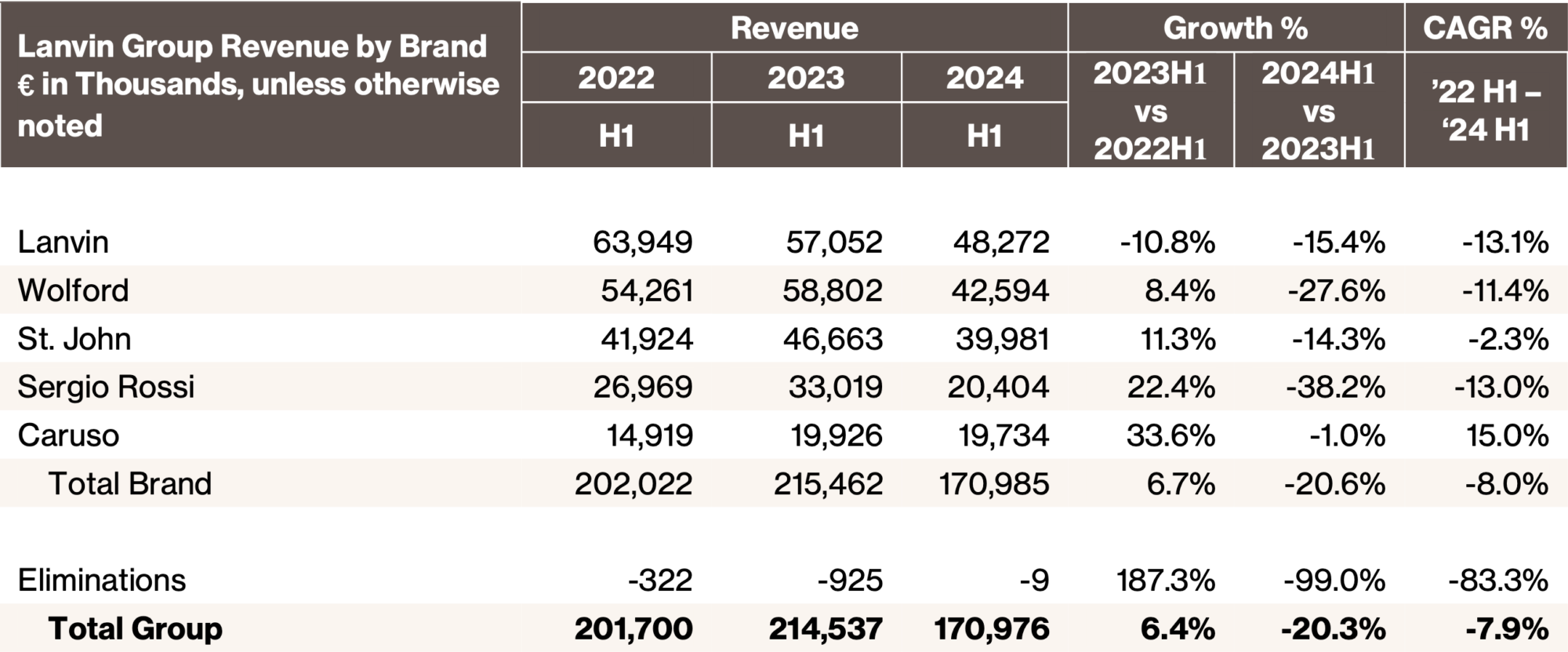

Selected Highlights
Continued cost efficiency initiatives effective in maintaining Gross profit margin: Gross profit margin for the Group decreased by 1% due to effective efforts to improve cost efficiencies. Better full-price sell-through, inventory management, and channel mix changes drove gross profit margin up 2% at Lanvin, up 7% at St. John, and up nearly 3% at Caruso. Despite lower revenue, Sergio Rossi maintained relatively flat gross profit margin, and Wolford’s gross profit margin was mainly impacted by delays from integration with a new logistics provider that resulted in an inability to absorb fixed production costs.
Group Adjusted EBITDA declined only 3%, period-over-period: In the face of strong topline challenges, the Group’s Adjusted EBITDA decreased from €41 million to a €42 million loss due to effective and timely cost reduction initiatives at the brand level. The Group provided resources and coordinated with brand executives in the first half to manage through the difficult market conditions.
Lanvin announces new Artistic Director: In June 2024, Lanvin announced that Peter Copping will be joining the brand in the second half of the year as the new Artistic Director. Mr. Copping brings to the brand and business a passion for and deep understanding of Lanvin’s heritage and a wealth of industry experience. He will lead the creative direction of both women’s and menswear and introduce his vision for Lanvin in 2025.
New personnel announcement: Wolford appointed Regis Rimbert as the new CEO of the brand in June 2024. Mr. Rimbert brings over 20 years of experience in the fashion industry, where he has led transformative initiatives in retail, online, and international operations.
Lanvin Lab 2.0: Lanvin successfully launched the second edition of Lanvin Lab with a collaboration with acclaimed contemporary artist, Erwin Wurm. Lanvin’s iconic Pencil Cat Bag and Cash sneaker were incorporated into a monumental sculpture currently on a five-city tour throughout Greater China.
Review of First Half 2024 Financials
Revenue
For H1 2024, the Group generated revenue of €171 million, a 20% decrease period-over-period. DTC channel revenue decreased by 14% and Wholesale revenue by 30%. Other revenue growth comprised of royalty and clearance income decreased 15% due to Lanvin’s reduction of clearance inventory. Regional revenue declined in EMEA by 27% and Greater China at 24% (Asia excluding Greater China decreased by 7%), and North America by 11%.
The main drivers of the decline in revenue were global market softness coupled with a struggling wholesale market. Additionally, Wolford had an integration issue with its new logistic provider which significantly delayed shipments, and Sergio Rossi had a strategically planned reduction in third-party production, both of which also contributed to the revenue decline.
Gross Profit
Gross profit was €98 million, representing a 58% margin versus €125 million for H1 2023 at a margin of 59%. The Group continues to focus on scale, product mix improvements and distribution management to drive the gross profit margin expansion.
Contribution Profit(1)
Contribution profit was -€7 million. While cost reduction initiatives were undertaken, the Group was committed to investing in marketing spend with the long-term brand momentum in mind, resulting in a lower contribution profit.
Adjusted EBITDA
Adjusted EBITDA for the Group declined to -€42 million versus -€41 million for H1 2023, resulting from lower revenue, but offset by a reduction of fixed general and administrative expenses, decreasing from 36% to 34% of revenue. In the first half, the Group was able to effectively implement cost reductions to mitigate the revenue impact.
Results by Segment
Lanvin: Revenue decreased from €57 million in H1 2023 to €48 million in H1 2024, mainly due to a slowdown in global luxury consumption coupled with a challenging wholesale market. Retail including boutique and outlet was down only 3%, while the overall DTC channel declined by 10%; and Wholesale by 23%.
Globally, EMEA saw the largest decrease at 21%, driven by a decrease in European wholesale receipts. North America and APAC declined by 9% with Greater China at 14%; APAC excluding Greater China generated positive 9% growth.
Gross profit decreased to €28 million from €32 million. Gross profit margin increased from 56% to 58%, due to increased full-price sell-through and strategic inventory management. Contribution profit declined from a contribution loss of €5 million in H1 2023 to a contribution loss of €9 million in H1 2024.
In June 2024, Lanvin announced the September arrival of Peter Copping as Artistic Director. The house intends to propel the brand momentum from this significant appointment in the development and marketing of Mr. Copping’s debut collection launch in 2025.
For the balance of 2024, Lanvin is aggressively executing initiatives to increase retail and digital traffic and implement operational cost efficiencies to improve DTC profitability. The brand will continue to emphasize its leather goods and accessories offer and will further build out its seasonless carryover product offer across categories.
Wolford: Revenue declined by 28% from €59 million in H1 2023 to €43 million in H1 2024. The decrease was mainly drive by integration issues with its new logistics provider that resulted in significant delays in shipments. Additionally, the challenging wholesale market in Europe also impacted revenue.
On a channel-basis, DTC decreased by 14% and Wholesale by 53%. Geographically, EMEA saw the largest decrease at 34%, North America by 10%, and APAC by 24% with Greater China seeing a 20% decline.
Gross profit margin decreased to 63% from 72% due to the logistics issues as well as a planned liquidation of excess inventory. Contribution loss was €8 million.
In the first half, Wolford made a number of personnel changes, most notably, the appointment of Regis Rimbert as CEO. Mr. Rimbert’s experience operating in luxury fashion is extensive and he will drive second half initiatives to implement a sustainable cost model by transforming supply chain and distribution, as well as focus on brand positioning and marketing, and improve the client experience.
Sergio Rossi: Revenue declined from €33 million in H1 2023 to €20 million in H1 2024, or 38%. The brand had a 49% decline in its largest market, EMEA, and 22% in APAC with Greater China decreasing by 34%. The revenue impact was due to continued softness in wholesale as well as a planned reduction of third-party production. The DTC channel was down 17% overall and e-Commerce by 2%. Wholesale, which includes third-party production, decreased by 60%.
Gross profit margin landed at 50%, relatively flat from H1 2023, due to the change in channel mix with the decline in wholesale revenue, including the reduction of third-party production. Contribution profit declined from €6 million to €1 million. The revenue impact was mitigated by cost control initiatives to maintain positive contribution profit.
For the second half of 2024, the brand will drive cost efficiencies through planned initiatives and supply chain improvements. Sergio Rossi also plans to continue to right-size its retail fleet and overhead.
The brand also plans to emphasize new marketing initiatives celebrating its heritage and renowned shoe archive with the anticipated arrival of the new Creative Director, Paul Andrew. The brand announced in July 2024, that Paul Andrew will join Sergio Rossi in the second half.
St. John: Revenue decreased from €47 million in H1 2023 to €40 million in H1 2024, a decline of 14%. The revenue impact was consistent across the distribution channels with DTC, including e-Commerce declining by 15%; and Wholesale by 13%. North America, by far its largest market, decreased by 10%, while APAC, which represents less than 10% of revenue, was down 46%, due to general market softness.
Gross profit margin was significantly higher growing from 62% to 69% due to increased full-price sell-through and better channel mix. Contribution profit margin remained steady at 12% from improved marketing efficiency mitigating the decline in revenue.
For the second half of 2024, the brand will continue to push its “basics” product lines and further refine its retail network and overhead.
Caruso: Despite a challenging global luxury and wholesale environment, Caruso maintained flat revenue with a 1% decline. Caruso’s Maisons business, its third-party production unit showed some softness, but it was offset by its propriety Caruso brand business which grew by 21% with strong sales of its ready-to-wear and made-to-measure products.
Gross profit increased from €5 million to €6 million, and gross profit margin increased from 26% to 29% from improved in-house production efficiencies and a reduction of outsourcing. Contribution profit also increased from €4 million to €5 million, and contribution profit margin increased from 22% to 24%.
For the remainder of 2024, the brand will continue to expand its B2B Maisons business with new client development programs.
2024 Full-Year Outlook
The Group expects a challenging second half of 2024, but will remain proactive in its cost-reduction and operating efficiency efforts. Lanvin and Sergio Rossi plan to further emphasize marketing initiatives to forge their creative paths for 2025 with the additions of Peter Copping and Paul Andrew, respectively.
Lanvin Group will continue to focus on revenue expansion opportunities through marketing campaigns to maintain brand momentum and with a tactical approach to expand its store network.
———————————-
Note: All % changes are calculated on an actual currency exchange rate basis.
Note: This communication includes certain non-IFRS financial measures such as Contribution Profit, Contribution Profit Margin, Adjusted Operating Profit, adjusted earnings before interest and taxes (“Adjusted EBIT”), and adjusted earnings before interest, taxes, depreciation and amortization (“Adjusted EBITDA”). Please see Use of Non-IFRS Financial Metrics and Non-IFRS Financial Measures and Definition.
(1) Contribution Profit defined as Gross Profit less Selling and Marketing Expenses
***
Semi-Annual Report
Our semi-annual report, including the interim condensed consolidated financial statements as of and for the six months ended June 30, 2024, can be downloaded from the Company’s investor relations website (ir.lanvin-group.com) under the section Financials / SEC Filings, or from the SEC’s website (www.sec.gov).
***
Conference Call
As previously announced, today at 8:00AM EST/8:00PM CST/2:00PM CET, Lanvin Group will host a conference call to discuss its results for the first half of 2024 and provide an outlook for the remainder of the year. Management will refer to a slide presentation during the call, which will be made available on the day of the call. To view the presentation, please visit the “Events” tab of the Group’s investor relations website at https://ir.lanvin-group.com.
All participants who would like to join the conference call must pre-register using the link provided below. Once the registration is complete, participants will receive dial-in numbers, a passcode, and a registrant ID which can be used to join the conference call. Participants may register at any time, including up to and after the call starts.
Registration Link:
https://dpregister.com/sreg/10191932/fd4d899a20
A replay of the conference call will be accessible approximately one hour after the live call until September 2, 2024, by dialing the following numbers:
US Toll Free: 1-877-344-7529
International Toll: 1-412-317-0088
Canada Toll Free: 855-669-9658
Replay Access Code: 9453870
A recorded webcast of the conference call and a slide presentation will also be available on the Group’s investor relations website at https://ir.lanvin-group.com.
***
About Lanvin Group
Lanvin Group is a leading global luxury fashion group headquartered in Shanghai, China, managing iconic brands worldwide including Lanvin, Wolford, Sergio Rossi, St. John Knits, and Caruso. Harnessing the power of its unique strategic alliance of industry-leading partners in the luxury fashion sector, Lanvin Group strives to expand the global footprint of its portfolio brands and achieve sustainable growth through strategic investment and extensive operational know-how, combined with an intimate understanding and unparalleled access to the fastest-growing luxury fashion markets in the world. Lanvin Group is listed on the New York Stock Exchange under the ticker symbol ‘LANV’. For more information about Lanvin Group, please visit www.lanvin-group.com, and to view our investor presentation, please visit https://ir.lanvin-group.com.
***
Forward-Looking Statements
This communication, including the section “2024 Full-Year Outlook”, contains “forward-looking statements” within the meaning of the “safe harbor” provisions of the Private Securities Litigation Reform Act of 1995. Forward-looking statements generally are accompanied by words such as “believe,” “may,” “will,” “estimate,” “continue,” “anticipate,” “intend,” “expect,” “should,” “would,” “plan,” “predict,” “potential,” “seem,” “seek,” “future,” “outlook,” “project” and similar expressions that predict or indicate future events or trends or that are not statements of historical matters. These forward-looking statements include, but are not limited to, statements regarding estimates and forecasts of other financial and performance metrics and projections of market opportunity. These statements are based on various assumptions, whether or not identified in this communication, and on the current expectations of the respective management of Lanvin Group and are not predictions of actual performance. These forward-looking statements are provided for illustrative purposes only and must not be relied on by an investor as, a guarantee, an assurance, a prediction or a definitive statement of fact or probability. Actual events and circumstances are difficult or impossible to predict and will differ from assumptions. Many actual events and circumstances are beyond the control of Lanvin Group. Potential risks and uncertainties that could cause the actual results to differ materially from those expressed or implied by forward-looking statements include, but are not limited to, changes adversely affecting the business in which Lanvin Group is engaged; Lanvin Group’s projected financial information, anticipated growth rate, profitability and market opportunity may not be an indication of its actual results or future results; management of growth; the impact of COVID-19 or similar public health crises on Lanvin Group’s business; Lanvin Group’s ability to safeguard the value, recognition and reputation of its brands and to identify and respond to new and changing customer preferences; the ability and desire of consumers to shop; Lanvin Group’s ability to successfully implement its business strategies and plans; Lanvin Group’s ability to effectively manage its advertising and marketing expenses and achieve desired impact; its ability to accurately forecast consumer demand; high levels of competition in the personal luxury products market; disruptions to Lanvin Group’s distribution facilities or its distribution partners; Lanvin Group’s ability to negotiate, maintain or renew its license agreements; Lanvin Group’s ability to protect its intellectual property rights; Lanvin Group’s ability to attract and retain qualified employees and preserve craftmanship skills; Lanvin Group’s ability to develop and maintain effective internal controls; general economic conditions; the result of future financing efforts; and those factors discussed in the reports filed by Lanvin Group from time to time with the SEC. If any of these risks materialize or Lanvin Group’s assumptions prove incorrect, actual results could differ materially from the results implied by these forward-looking statements. There may be additional risks that Lanvin Group presently does not know, or that Lanvin Group currently believes are immaterial, that could also cause actual results to differ from those contained in the forward-looking statements. In addition, forward-looking statements reflect Lanvin Group’s expectations, plans, or forecasts of future events and views as of the date of this communication. Lanvin Group anticipates that subsequent events and developments will cause Lanvin Group’s assessments to change. However, while Lanvin Group may elect to update these forward-looking statements at some point in the future, Lanvin Group specifically disclaim any obligation to do so. These forward-looking statements should not be relied upon as representing Lanvin Group’s assessments of any date subsequent to the date of this communication. Accordingly, reliance should not be placed upon the forward-looking statements.
***
Use of Non-IFRS Financial Metrics
This communication includes certain non-IFRS financial measures such as Contribution Profit, Contribution Profit Margin, Adjusted Operating Profit, adjusted earnings before interest and taxes (“Adjusted EBIT”), and adjusted earnings before interest, taxes, depreciation and amortization (“Adjusted EBITDA”). These non-IFRS measures are an addition, and not a substitute for or superior to measures of financial performance prepared in accordance with IFRS and should not be considered as an alternative to net income, operating income or any other performance measures derived in accordance with IFRS. Reconciliations of non-IFRS measures to their most directly comparable IFRS counterparts are included in the Appendix to this communication. Lanvin Group believes that these non-IFRS measures of financial results provide useful supplemental information to investors about Lanvin Group. Lanvin Group believes that the use of these non-IFRS financial measures provides an additional tool for investors to use in evaluating projected operating results and trends in and in comparing Lanvin Group’s financial measures with other similar companies, many of which present similar non-IFRS financial measures to investors. However, there are a number of limitations related to the use of these non-IFRS measures and their nearest IFRS equivalents. For example, other companies may calculate non-IFRS measures differently, or may use other measures to calculate their financial performance, and therefore Lanvin Group’s non-IFRS measures may not be directly comparable to similarly titled measures of other companies. Lanvin Group does not consider these non-IFRS measures in isolation or as an alternative to financial measures determined in accordance with IFRS. The principal limitation of these non-IFRS financial measures is that they exclude significant expenses, income and tax liabilities that are required by IFRS to be recorded in Lanvin Group’s financial statements. In addition, they are subject to inherent limitations as they reflect the exercise of judgements by Lanvin Group about which expense and income are excluded or included in determining these non-IFRS financial measures. In order to compensate for these limitations, Lanvin Group presents non-IFRS financial measures in connection with IFRS results.
***
Enquiries:
Media
Lanvin Group
Kimberly Zhang
kimberly.zhang@lanvin-group.com
Investors
Lanvin Group
James Kim
james.kim@lanvin-group.com
Appendix
Lanvin Group Consolidated Income Statement
(€ in Thousands, unless otherwise noted)
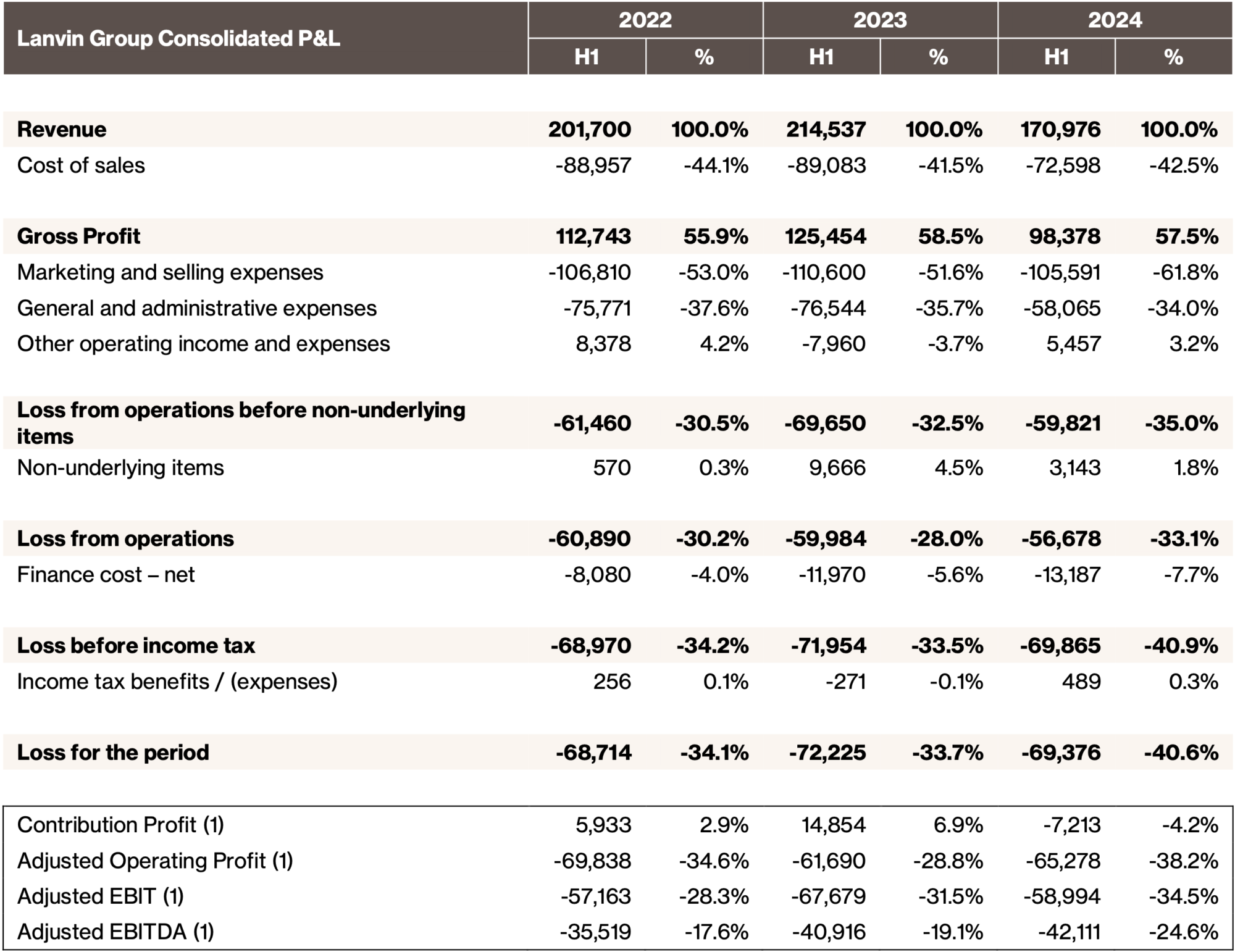
Lanvin Group Consolidated Balance Sheet
(€ in Thousands, unless otherwise noted)
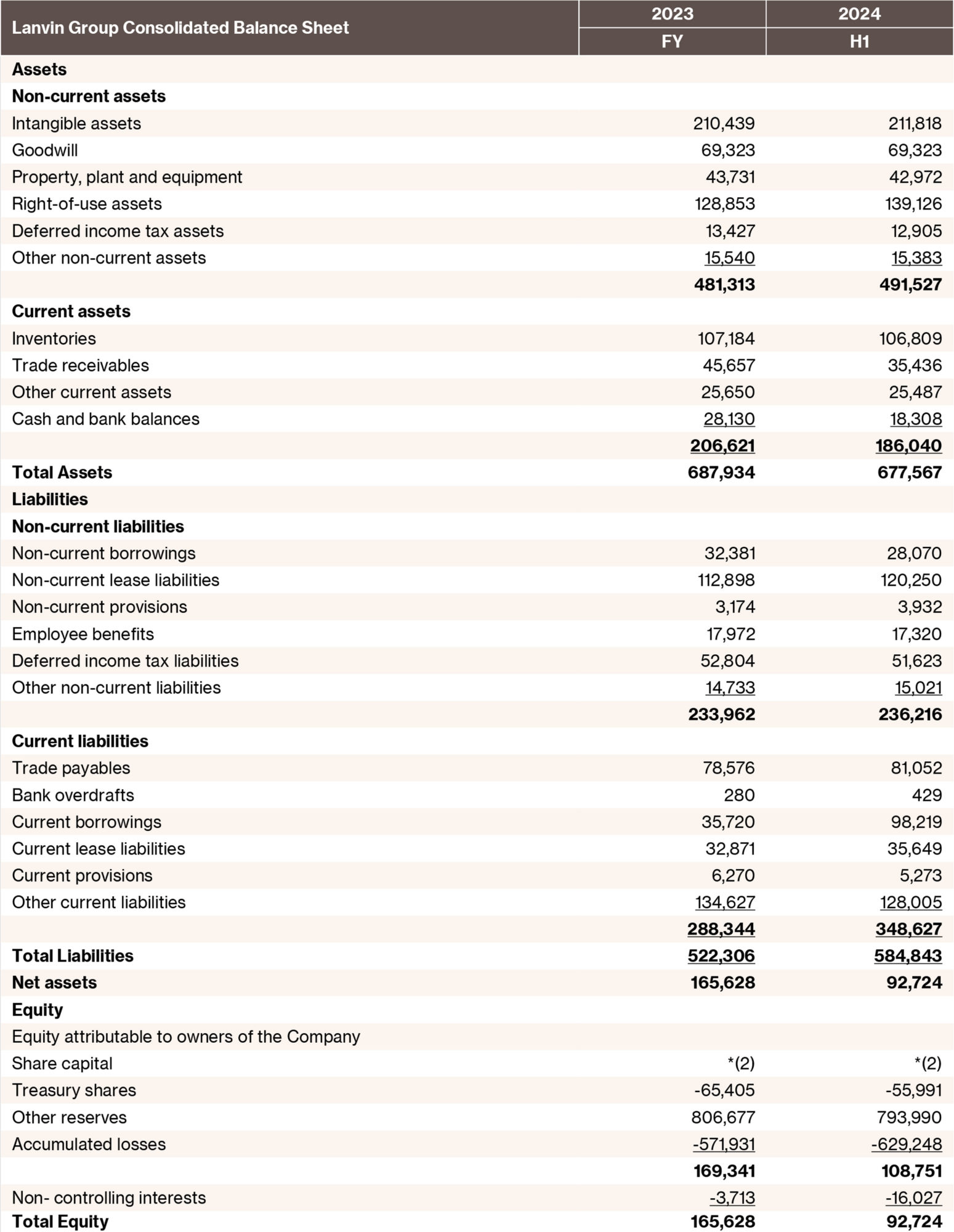
Lanvin Group Consolidated Cash Flow
(€ in Thousands, unless otherwise noted)
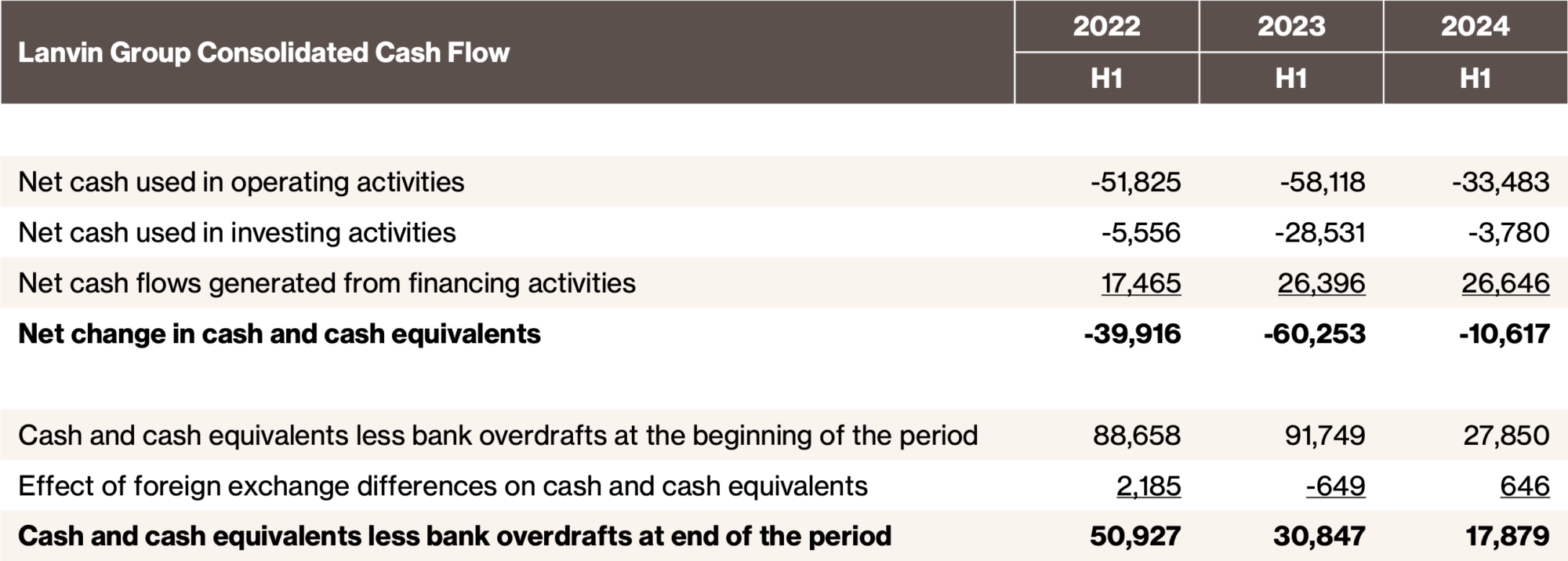
Lanvin Brand Key Financials(3)
(€ in thousands, unless otherwise noted)
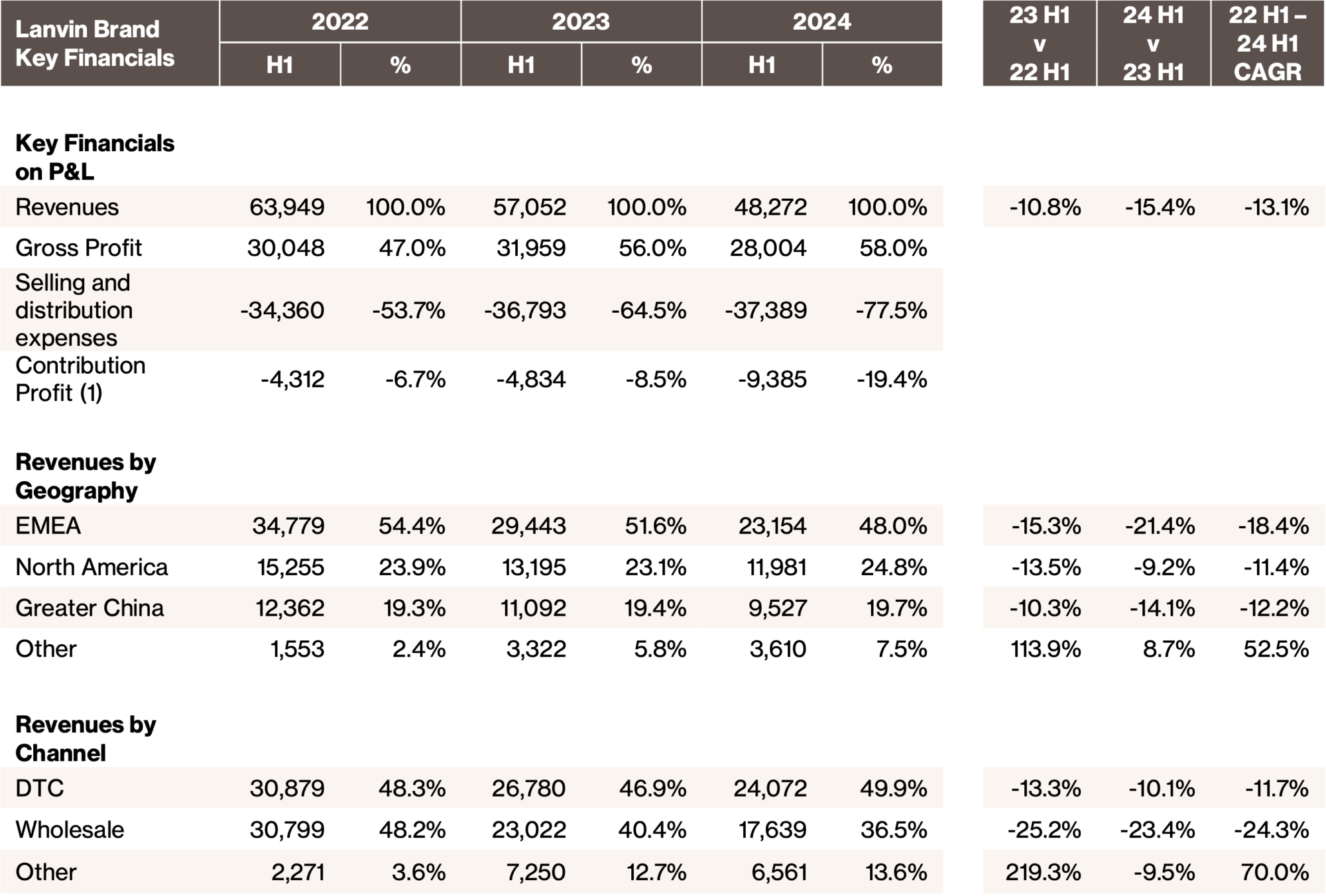
Wolford Brand Key Financials(3)
(€ in thousands, unless otherwise noted)
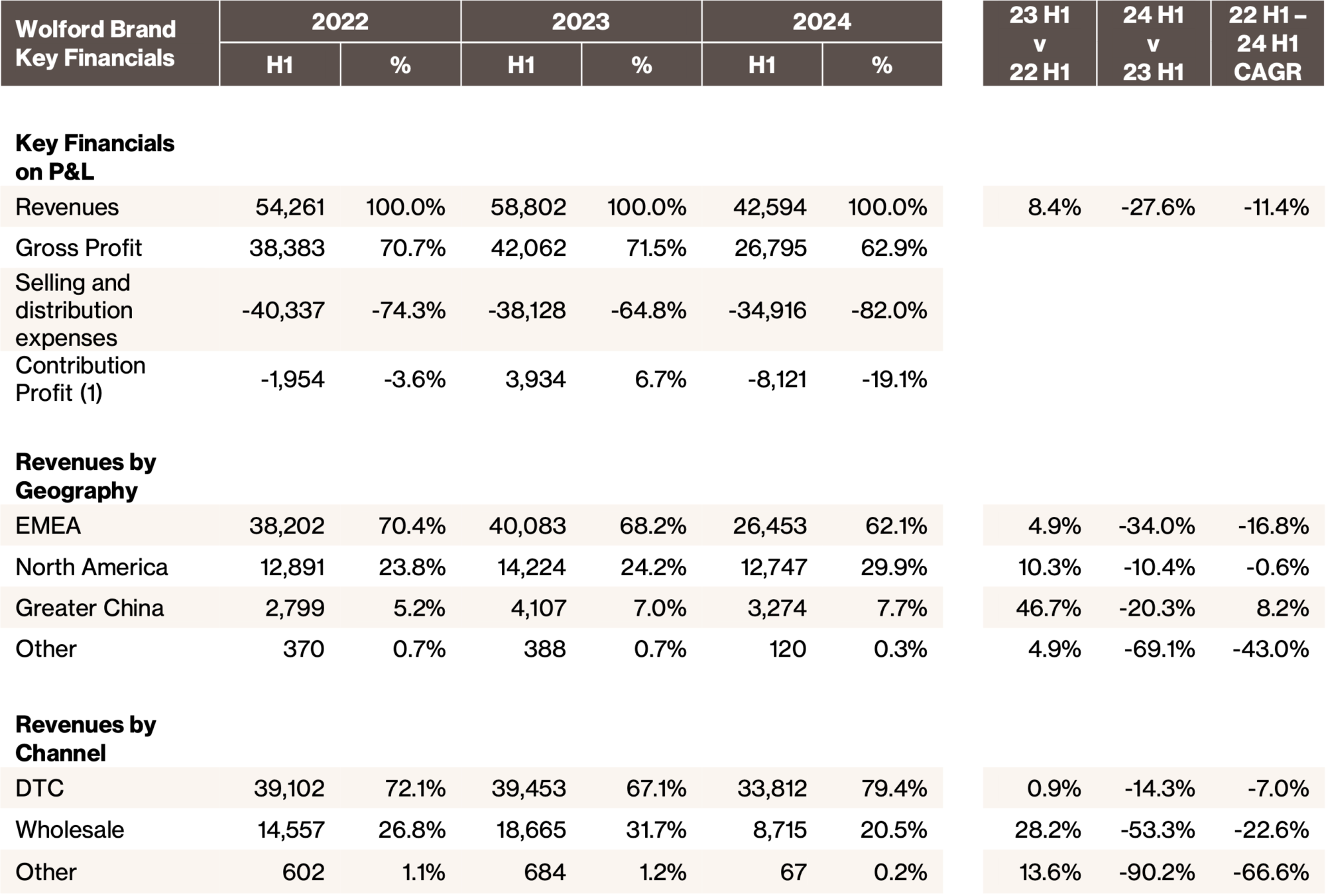
Sergio Rossi Brand Key Financials(3)
(€ in thousands, unless otherwise noted)
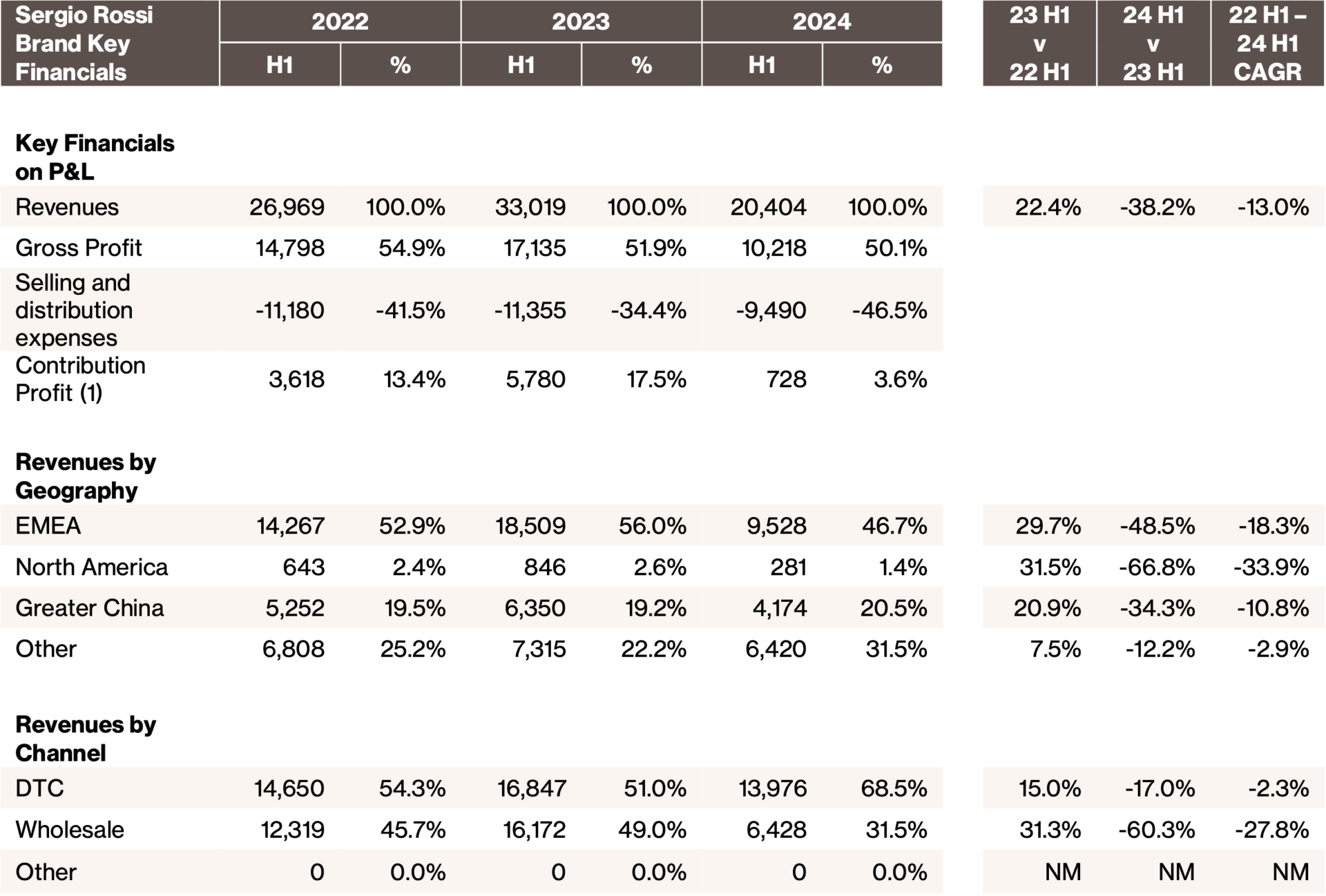
St. John Brand Key Financials(3)
(€ in thousands, unless otherwise noted)
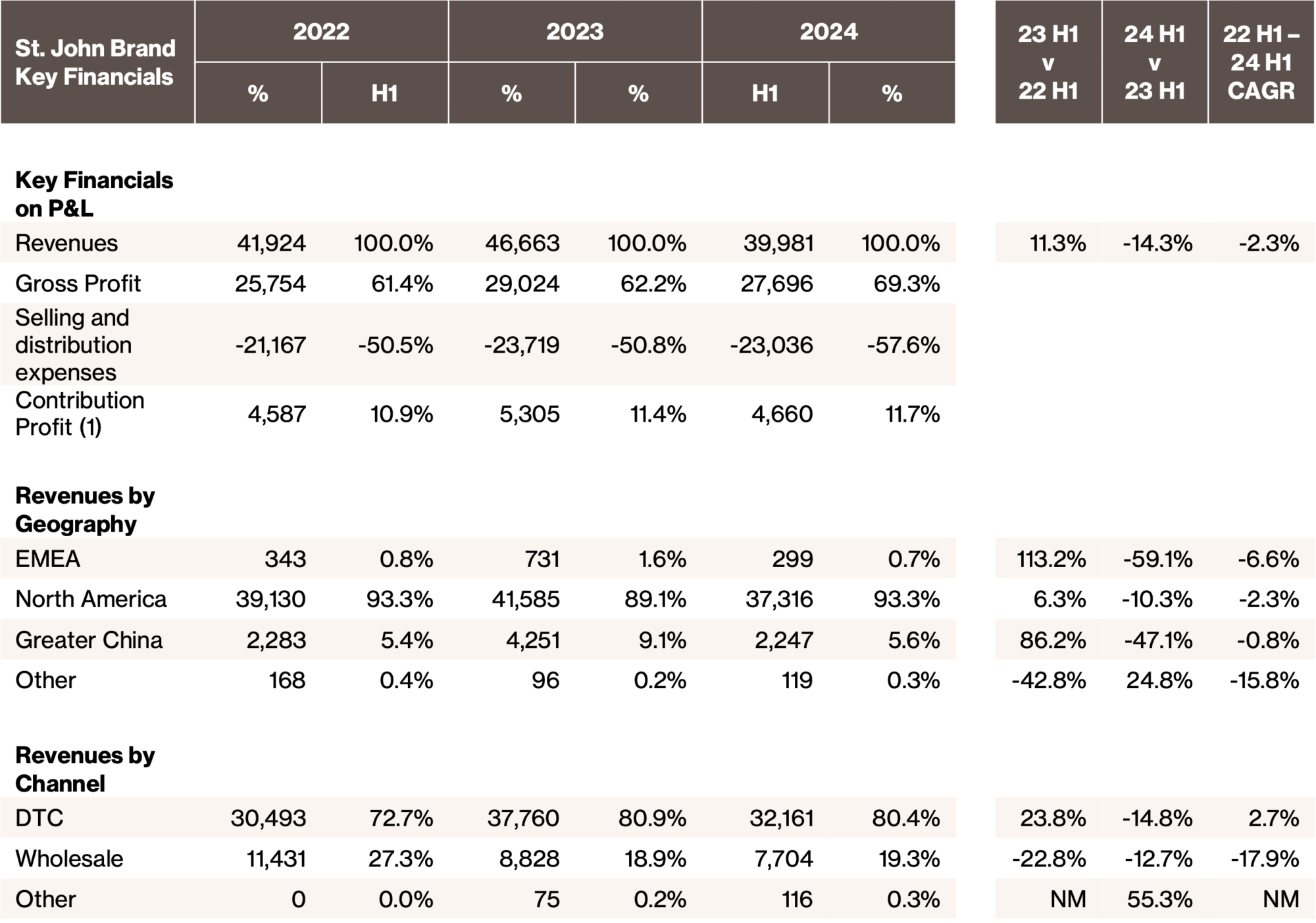
Caruso Brand Key Financials(3)
(€ in thousands, unless otherwise noted)
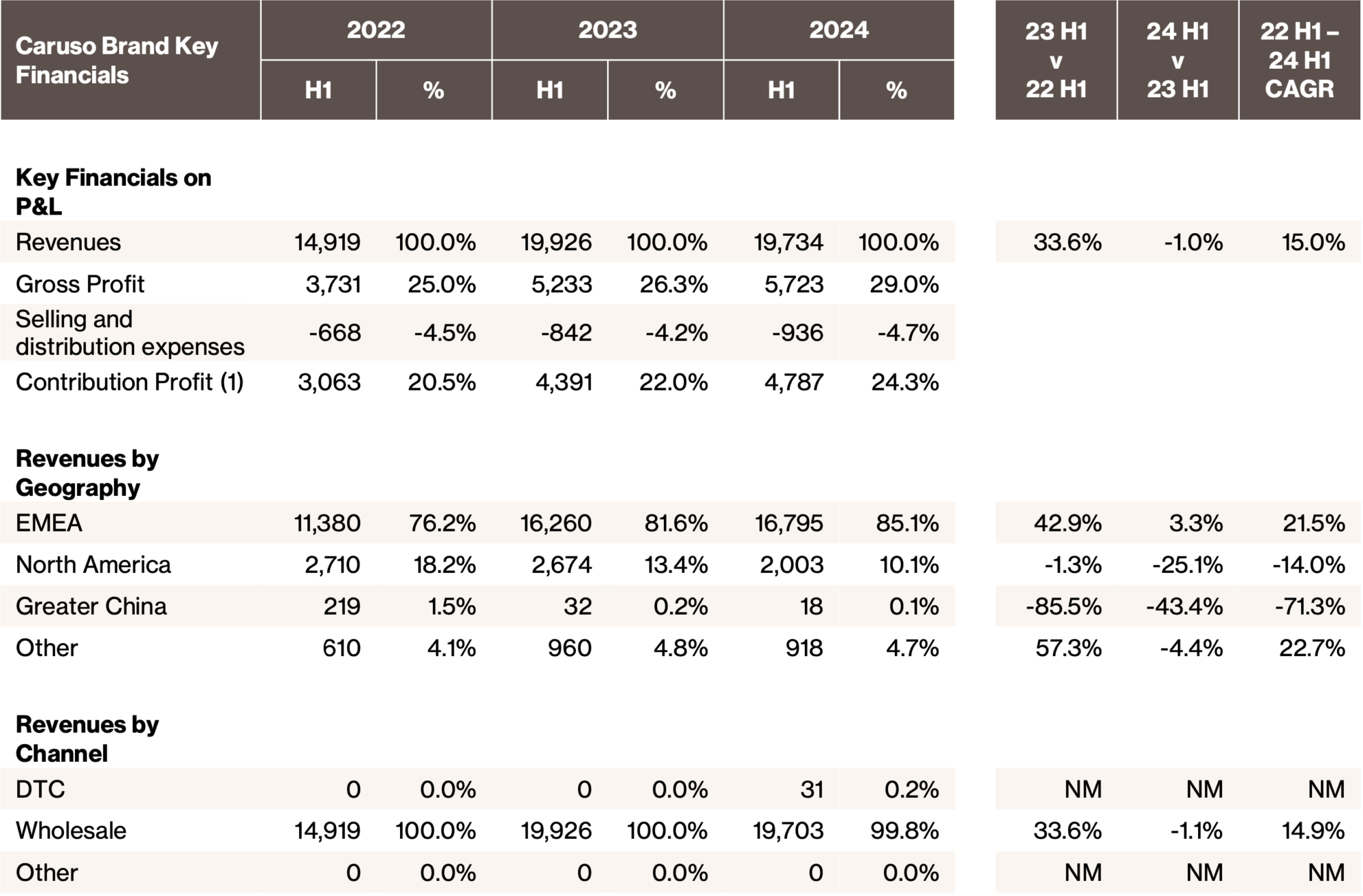
Lanvin Group Brand Footprint

Non-IFRS Financial Measures Reconciliation
(€ in Thousands, unless otherwise noted)

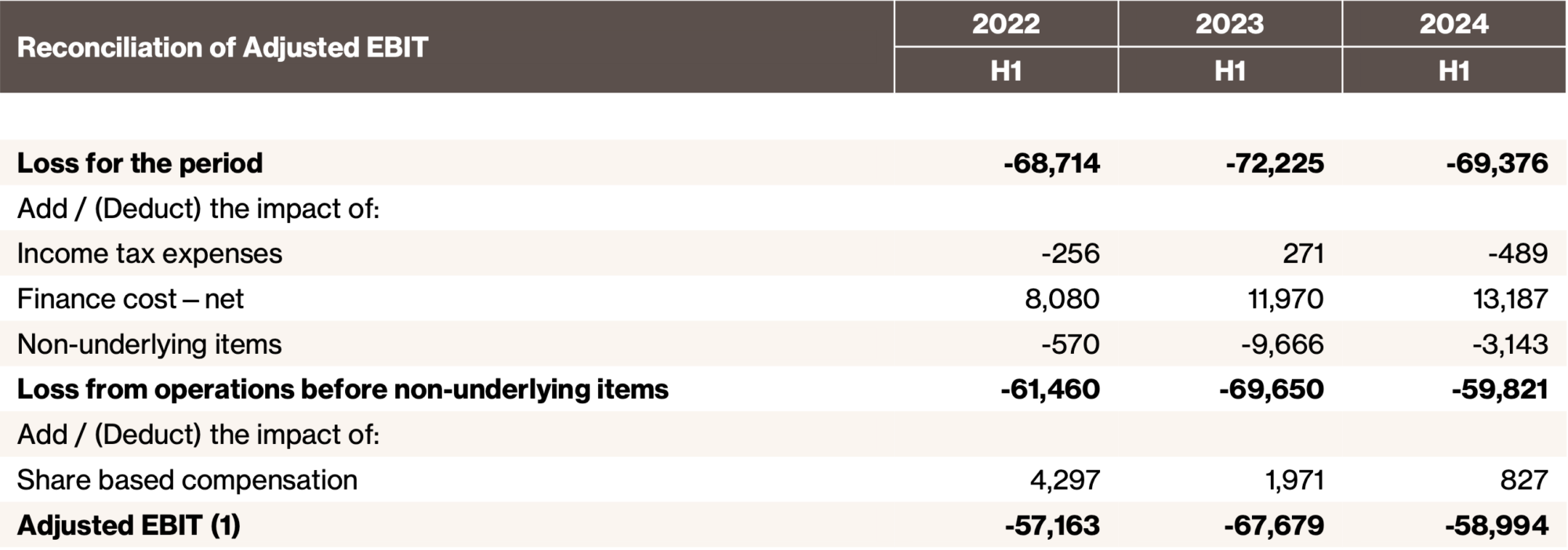

———————————-
Note:
(1) These are Non-IFRS Financial Measures and will be mentioned throughout this communication. Please see Non-IFRS Financial Measures and Definition.
(2) The amount less than Euro 1,000 is indicated with “*”.
(3) Brand-level results are presented exclusive of eliminations.
(4) DOS refers to Directly Operated Stores which include boutiques, outlets, concession shop-in-shops and pop-up stores.
Non-IFRS Financial Measures and Definitions
Our management monitors and evaluates operating and financial performance using several non-IFRS financial measures including: Contribution Profit, Contribution Profit Margin, Adjusted Operating Profit, Adjusted EBIT and Adjusted EBITDA. Our management believes that these non-IFRS financial measures provide useful and relevant information regarding our performance and improve their ability to assess financial performance and financial position. They also provide comparable measures that facilitate management’s ability to identify operational trends, as well as make decisions regarding future spending, resource allocations and other operational decisions. While similar measures are widely used in the industry in which we operate, the financial measures that we use may not be comparable to other similarly named measures used by other companies nor are they intended to be substitutes for measures of financial performance or financial position as prepared in accordance with IFRS.
Contribution Profit is defined as revenue less the cost of sales and selling and marketing expenses. Contribution Profit subtracts the main variable expenses of selling and marketing expenses from Gross Profit, and our management believes this measure is an important indicator of profitability at the marginal level. Below contribution profit, the main expenses are general administrative expenses and other operating expenses (which include foreign exchange gains or losses and impairment losses). As we continue to improve the management of our portfolio brands, we believe we can achieve greater economy of scale across the different brands by maintaining the fixed expenses at a lower level as a proportion of revenue. We therefore use Contribution Profit Margin as a key indicator of profitability at the group level as well as the portfolio brand level.
Contribution Profit Margin is defined as Contribution Profit divided by revenue.
Adjusted Operating Profit is defined as Contribution Profit margin less General and administrative expenses
Adjusted EBIT is defined as profit or loss before income taxes, net finance cost, share based compensation, adjusted for income and costs which are significant in nature and that management considers not reflective of underlying operational activities, mainly including net gains on disposal of long-term assets, negative goodwill from acquisition of Sergio Rossi, gain on debt restructuring and government grants.
Adjusted EBITDA is defined as profit or loss before income taxes, net finance cost, exchange gains/(losses), depreciation, amortization, share based compensation and provisions and impairment losses adjusted for income and costs which are significant in nature and that management considers not reflective of underlying operational activities, mainly including net gains on disposal of long-term assets, negative goodwill from acquisition of Sergio Rossi, gain on debt restructuring and government grants.
